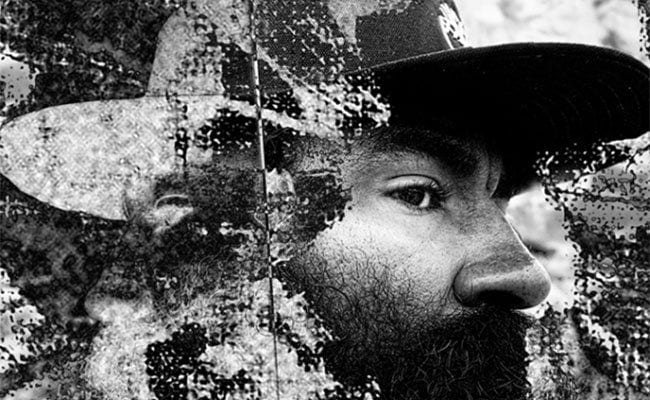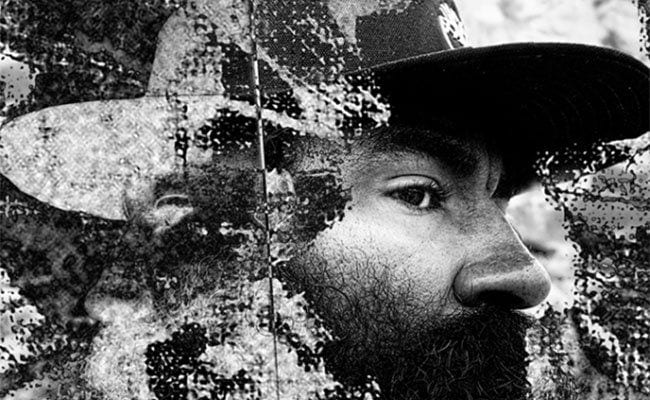
The Mandela Effect. The collective misremembering of details or events, named after the rather peculiar instance of a large group of unconnected people sharing the same memory. In this case the erroneous recollection of Nelson Mandela’s death in prison in the mid-1980s rather than his actual death in December 2013. This “effect” has snowballed in popularity since then as people began to seemingly find further examples. For those of us who could have sworn they left their car keys on the table, this is simply a sign of our overworked and overstimulated brains playing tricks on us. For others, it means something far more serious. It is a sign that we are living in an alternate reality.
This idea of an alternate, parallel existence perfectly summarizes this alternative take on Gonjasufi’s Callous album. Rather than serving as a straight remix album, the album is more of a companion piece as it features additional songs and covers as well as multiple re-imaginings of some of the songs on that album. Therefore, it serves as something of an alternate take on his vision for the original, one that might prompt the listener to misremember the songs from Callous completely. For the album Gonjasufi (aka Sumach Ecks) has been able to call on an impressive list of artists to help out such as Massive Attack’s, Daddy G, alternative rap duo, Shabazz Palaces, Sonnymoon’s Anna Wise, Philadelphia DJ, King Britt and a genuine legend in Fela Kuti drummer Tony Allen.
After a spacey intro which sounds like a spaceship hovering overhead, the album opens with an unexpected cover. Naturally, “Show” is a much more warped take on Beth Gibbons & Rustin Man’s song from their Out Of Season album. Here, hollow, metallic percussion is fused with jagged and twisted guitar lines with Ecks’ voice sounding eerily similar to Chino Moreno on his more electronic work with Team Sleep. Eck demonstrates just how effortless he can create an atmosphere of dark, simmering menace. The first remix on the album, “Your Maker”, is an undoubted highlight as Daddy G from Massive Attack gives his glitchy, fidgety take on it. If anything it is even more confrontational than the original as he accents the mood with a rush of darting beats. It grows ever more threatening as the sound intensifies coming over as tense as a Wild West barroom before it erupts into violence.
The backbone of the album is provided by three remixes of “Afrikan Spaceship” which, unsurprisingly, vary enormously. Shabazz Palaces give it an even more left field overhaul as they base the track around the sound of a revving motorcycle. The band split and fracture the song, seemingly testing out an array of different, cartoonish vocal effects. The result sounds like it was a lot of fun to make but not so much to listen to. The Ras G Ghettoscifi version is an even more experimental, avant-garde affair, as he dispenses with any notion of structure altogether and permeates the ambient atmospheric flow with all manner of gongs, bells, and whistles. Meanwhile, King Britt fuses a more conventional, steady beat to the swirling vocals and even adds some tribal chanting. Of the three, it is probably the most successful.
The first of two reinterpretations of the song “Maniac Depressant” on here, sees Perera Elsewhere give it a spooky, gothic makeover. The use of trip-hop electronic beats, reverb and the sound of a theremin gives it a haunted fairground attraction vibe, accentuated by muffled, distant chanting. The second is a much more visceral, industrial sounding affair. Brazilian producer, Innsyter, reshapes it into something more brutish with assaultive beats and layers of distortion giving it a real sense of dread. “The Conspiracy” is the most surprising reworking on the album as Santino Romeri turns it into a neo-indie folk piece replete with thickly strummed acoustic guitar chords. It could comfortably be a lost Bends-era Radiohead B-side particularly since Eck’s vocals contain a similar jaded and worn out bent. It builds to a crescendo of spaced out percussion and multi-tracked vocal loops. It’s something of a surprise to have a more traditional folk song surrounded by the off-kilter tracks on offer, but it compliments the album beautifully.
“Your Maker” sees frequent Kendrick Lamar collaborator, Anna Wise, give a more stripped-back and sultry reading of the song. It has a slightly sinister, haunting feeling with a trippy backing not unlike a song Tricky would have been proud of. Possibly the most widely known song from Callous, “Vinaigrette”, retains the hypnotic feel of the original but takes it in another direction entirely as it descends into a more spun-out druggy piece of psychedelic dub. “Etherwave” features a very special guest in the form of Tony Allen. Wisely, Ganjasufi doesn’t try to emulate Fela Kuti’s Afro-beat sound but rather allows Allen’s drumming to propel the song in short bursts giving it a jazzier strut. Before long the song crashes to a halt as it drifts into a more ambient crawl.
It is incredibly difficult to make remix albums hang together well and Mandela Effect is no different. There is a distinct absence of flow to the album as each reinterpretation proves to be so radically different. Nonetheless, each guest adds something memorable with certain songs arguably more powerful than the originals. Impressively, the whole thing retains the angular peril and stifling claustrophobia of the original but with slightly more light and shade. As an alternate version of his Callous album, it is one well worth remembering.

